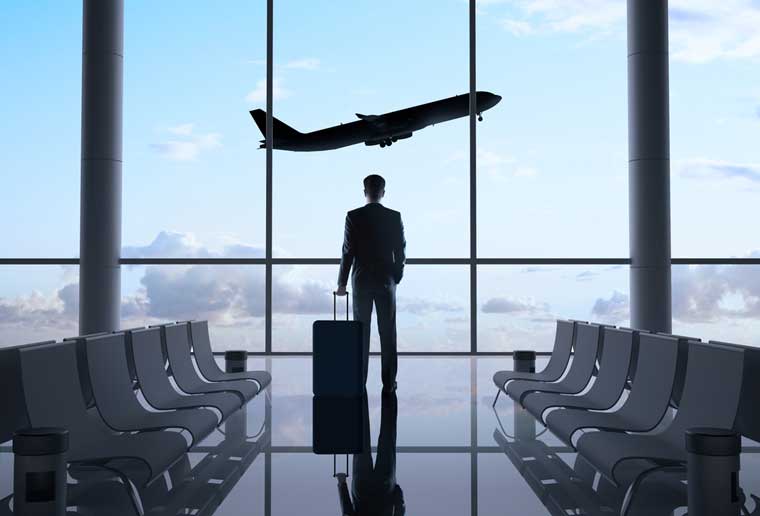Corporate travel Corporate travel spend in the U.S. and Europe is projected to surpass half of 2019 levels in the first half of 2023 and rise to two-thirds by the end of the year, according to a new report released by Deloitte. Full recovery following the pandemic appears likely by late 2024 or early 2025 as higher costs and climate concerns continue to keep trip volumes smaller than pre-pandemic levels in “real terms”.
The study—conducted by weighing responses from 334 corporate travel managers – 106 U.S. travel manager and 228 European travel managers, divided about evenly between Spain, Germany, France and the U.K.—showed that spending volume should reach about 57 percent of 2019 levels in the first half of this year and increase to about 75 percent by the end of the year.
The growth, however, is coming amid “an environment of higher airfares and room rates,” which means the actual number of trips are lagging. A full recovery in business travel spending appears possible by the end of 2024, but the corporate travel market would remain about 10 percent to 20 percent below pre-pandemic levels accounting for inflation, according to the report.
While overall trajectories are similar for both U.S. and European travel managers, international trips will account for a larger portion of the recovery this year. The international share of travel costs for U.S. companies is expected to rise from 21 per cent in 2022 to 33 per cent in 2023., according to the survey.
These findings are key since corporate travel has seen very slow returns since the pandemic. A variety of factors appear to impact the decision to travel for business including employee safety, client interest in meeting in person, the value of attending a conference, and whether virtual conferencing platforms can replace a trip. Although pandemic concerns and testing regulations generally waned in the second half of 2022, financial concerns seem to continue to create uncertainty for the sector.
Suppliers Focused on Long-Term Relationships
While travel buyers are facing a tougher negotiating environment with suppliers, most buyers said they are satisfied with their results, though less so in Europe, according to the report. Sixty-three percent of U.S. travel managers said their airline pricing was favorable, and 54 percent of European travel managers said the same. The responses were similar for hotel agreements, according to Deloitte.
Workplace flexibility and technology continue to shift the course of business travel
Although pandemic concerns about travel generally declined among those surveyed, the ability to leverage technology in lieu of trips, ultimately reducing costs, continues to impact business travel’s growth trajectory. According to the survey, technology can support nearly every business need travel serves – to some degree. In addition, a future work from home rate is expected to be 3.2 times higher than before the pandemic.
Business leaders are weighing the benefit of in-person interactions, as internal trainings and team meetings (44 per cent) are rated the most replaceable by technology, compared to client rapport building (11 per cent) and client acquisition (7 per cent).
“As business travel continues its climb, higher airfare and hotel costs are likely slowing the increase in trips taken. As business leaders take a strategic view of their travel plans and the industry adapts to a new normal, live conferences and events in particular are proving they can offer effective opportunities to connect in person, especially as remote and hybrid work remain fixtures of the corporate world,” said Eileen Crowley, vice chair, Deloitte & Touche LLP and U.S. transportation, hospitality and services attest leader.
Sustainability Initiatives to Redefine ‘Recovery’
More than 40 percent of buyers said they are working to reduce their environment impact via corporate travel policy, though those efforts will not curb travel this year. About one-seventh of U.S. travel managers and one-fifth of European travel managers said their travel programs will see sustainability-related reductions in 2023. Larger percentages are planning for longer-term reductions, however, with about a third of U.S. travel managers and 40 percent of European travel mangers saying travel per employee will have to decrease by 20 percent or more by 2030 to meet their sustainability targets.
“The return of corporate travel continues to take a winding road as both business leaders and travel suppliers consider not just rising costs, but the necessity of certain in-person meetings amid the increasing use of technology to offset financial and environmental goals. Suppliers who take a long-term view of their relationships with travel buyers and communicate with them about their sustainability progress should be better poised to navigate ongoing shifts in travel priorities,” added Mike Daher, vice chair, Deloitte LLP and U.S. transportation, hospitality and services non-attest leader.


